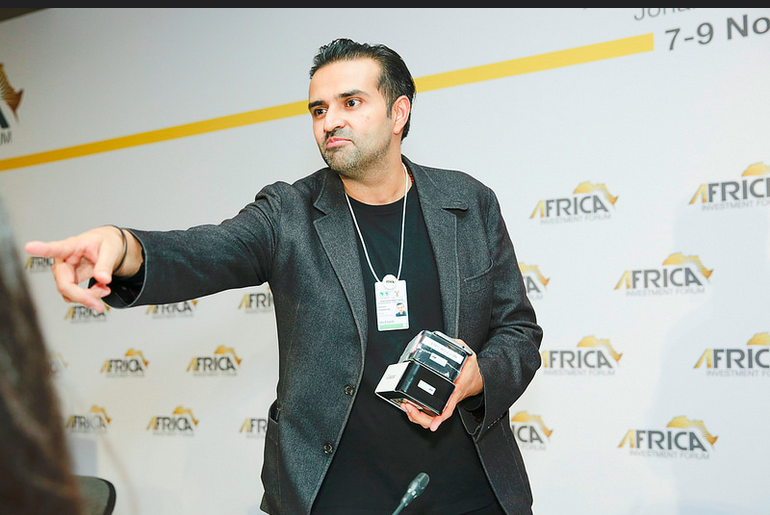
Fortune News | Aug 12,2023
On the first floor of the Shekina Building around Edna mall, Bole, there is Gresh Nail, Eyelash, Makeup, and Hair Salon. As you set foot in, there are three women sitting waiting for their next turn to get the beauty treatment. The room is packed and busy with about 30 women getting their nails and hair done and others getting their make-up done.
A woman in her 40s, Tigist Baede, has her hands protruding on a table for more than an hour while the manicurist in a black uniform is taking her time with the nails as carefully to achieve perfection. Tigist has been a customer of Gresh Salon for over five years mainly to get her nails done. Although there are times she lets loose and goes natural, she said that she enjoys adding extra features. Her makeup routine consists of applying Fair & Lovely whitening cream with lipstick and the occasional use of foundation.
"I try my best not to depend on it," she said.
She reminisced about her hair salon more than 14 years ago, in Dire Dewa before retiring to be a home manager. Despite her exposure to the beauty industry, Tigist adamantly opposes younger women with intact natural beauty using makeup.
Tigist believes that most women use makeup as a follow-up trend from various sources. The mother of two does not see it as a way to impress others but as an enhancement of the faded beauty due to old age and to boost her self-esteem. She has been dying her hair blond for the past 30 years.
“I like to see myself that way for some reason,” she said.
The owner Eyerusalem Getachew accredits the increased use of makeup on social media proliferation with emerging influencers. She appreciates a well-kept appearance and believes that it reflects confidence. According to Eyerusalem, most women come to the salon to get their nails done, paying more than a thousand Birr depending on the design.
Three years ago, she managed to open her salon.
The first woman singer and actress in Ethiopia, Asnakech Worku, wore noticeable make-up, and bright berry lipstick painted on which many women clamoured to resemble. In the '80s the country turned a corner with women wearing bright pink eyeshadow, while the '90s got low-key, showing off black smeared smoky eyes and mauve lips.
Helaz Beauty, founded by makeup artist and businesswoman Helen Hudush in 2019, is a cosmetics organization headquartered in the US. In 2019 it made its subsidiary branch in Ethiopia to make make-up more affordable and accessible to customers in the beauty industry. Helen's first started importing lipsticks half a decade ago, consisting of four types, and five years later, they grew the portfolio to more than 90 different products.
Natnael Zerihun, Helaz Country Director said that many people do not have access to quality makeup at an affordable price. Expensive products sold in the US cost less in Ethiopia. Foundations are sold for 100 dollars in the US and less than 33 dollars here.
They do not give their products to anyone to make a profit claiming that they want the product to be sold at the same price everywhere. They are currently administering four branches in Addis Abeba and another in Dire Dewa and Gondar.
Caption: A row of cosmetic shops await holiday shoppers at Zefmesh Mall in Megenagna area.
Helaz imports makeup products worth 100 million Br. In the last five months, Helaz imported 40 million Br worth of products from the US, with price inconsistencies because of the forex crunch, according to Nathanael.
Natnael said, “The point is to enhance the natural look.”
With such potential for the industry to flourish, huge companies such as MAC Cosmetics landed in Ethiopia. The New York-based brand, under the multinational Estee Lauder, opened its doors in the capital under a franchise agreement with NHY Import & Export, a company involved in retail.
Nur Hussien, a close friend of Mohammed Ali Al-Amoudi, formed the company in the early 1990s and was involved in the hospitality industry, running establishments such as London Cafe and Monaco Bar. Buyers pay thousands of Birr for small containers of products like concealer and eyeliner.
According to the salesperson, close to 100 customers visit the store on Namibia Street near Edna Mall. Foundation costs 4,500 Br, while lipstick costs 3,000 Br, and concealer prices range from 2,000 to 4,000 Br, depending on the size.
On the fifth floor of Tropical Mall, on Airport road, IMS make-up school was founded in 2020 by Lia Gole, an international make-up artist, and instructor. It gives three classes a day, each taking four to five hours for close to 30 students. Students pay 65,000 Br for seven weeks of the session. A year ago, IMS signed a deal with Temptu, a Newyork based, Airbrush company, to advance the make-up application through a makeover.
Kalkidan Arage is one of the make-up artists and assistant instructors at IMS. She came from knowing very little about make-up having only a passion for it. Kalkidan was a first-year accounting student when she decided to follow in the footsteps of Lia, learning by watching her.
“I loved make-up as much as I loved art when I was a kid,” Kalkidan told Fortune. She describes makeup as an illusion, saying that it will make the viewer focus on the face where the face feels different subconsciously.
She believes that the trend to wear makeup for most occasions has exploded in the last three or four years.
Kalkidan said that foundation is the main product in make-up with different shades that should be thoroughly considered in what goes on with every individual. She recommends that customers should use original products paying attention to morning and nighttime routines to hydrate and moisturise. For professionals such as Kalkidan, make-up is used beyond personal satisfaction.
"It is a form of art," she said.
Makeup is used beyond beauty enhancement. Bethlehem Abebe is one of the artists using makeup to express artistic talents. She is a special effects makeup artist. An architect by profession, her love for makeup grew when she was a little girl.
A week after Bethlehem opened her own makeup studio, the pandemic struck leaving her stranded. She was obliged to shut down her shop and stay at home, attending to world calamities. That is when she first plowed her way to special makeup for fun and posted them on social media.
"It unexpectedly attracted a lot of attention," she said.
That was a road map for Bethlehem to advance special effects of makeup as a profession, with her breakthrough after she participated as an art director in the Kassmase, one of the upcoming artists, "Negen Letizita" music video, which had massive feedback from the audience.
Bethlehem observes that makeup is beyond what people assume it to be. She recalled when a friend of hers was bruised and wanted to cover it up for a job interview the next day. Addressing the problem with her talent and seeing a friend gain her confidence made Bethlehem ecstatic.
She charges close to 10,000 Br for a bride and 3,000 Br for a bride’s maid. As a professional, she notes that it is harder to find the different types of skin shades in the market that are compatible with different types of skin tones.
"There are many darker complexion shades missing," she said. According to Bethlehem, people want to appear light-skinned than they actually are which might have influenced the market.
Four months ago, the Ministry of Finance banned imported goods under 38 categories, including cosmetics, packed foods, and furniture, from accessing letters of credit. A letter signed by the State Minister for Finance, Semereta Sewasew, attributed the ban to the decision by the federal macroeconomic team to give priority to essential imports, saying that it would remain in place indefinitely.
Following the decision, IMS was forced to source its products from MAC and Fenti local stores, leading them to increase school fees by 10,000 Br.
"The products are still expensive," said Kalkidan in disappointment.
Latex allergy from the eyelashes has been the most common reaction among customers. She recommends users know what type of skin they have before jumping to use any product. Sometimes customers fail to recognize their own skin and suffer the consequences, according to Kalkidan.
“One might see extremely bulged eyelids the next day,” she said.
Not everyone in the beauty industry is for makeup. The graphics editor at Dreamer Film Production, Bethlehem Tekle, said that she often fails to match women on their wedding day with their actual appearance.
The company, which was incorporated in 2012, has focused its business mainly on Photography and video production for the past six years.
Bethlehem, who has worked at the company for more than six years, recalls how people are using makeup now on a daily basis that used to be limited to special occasions like their wedding day.
Digafe Tsegaye (MD) is a Dermatologist and consultant at ABED Dermatology and Venerology specialty clinic who has had ten years of experience at Alert Hospital as a Dermatologist.
“80pc of women come to the clinic because of make-up misuse,” he said.
The whitening products that are injected with substances expose the face to more predicaments, according to Digafe.
People who use make-up should first come to a dermatologist and find out what their skin type is, matching the skin type.
According to the dermatologist, cosmetics that should be used every day such as moisturisers, and sunscreens are sold equally with whitening and skin-clarifying creams that are not recommended. He said that the products will cause skin thinning, and facial hairs with facial fungus infections as one predation 90pc of women face troubles.
“Most people use the forbidden product,” he said.
He believes that people who frequently make up will eventually lose confidence in social settings.
Cosmetics lacks monitoring and regulation, unlike the pharmaceutical industry, which the government has full hands on. Everyone can access make-up anytime, any place, while there is not much aware of what goes into the products.
PUBLISHED ON
Jan 07,2023 [ VOL
23 , NO
1184]

Fortune News | Aug 12,2023

Radar | Oct 12,2024

Featured | Oct 25,2020

Fortune News | Sep 04,2021

Commentaries | Apr 17,2020

Fortune News | Jul 02,2022

Viewpoints | Apr 25,2020

Featured | Nov 21,2018


Life Matters | Jan 07,2024

Dec 22 , 2024 . By TIZITA SHEWAFERAW
Charged with transforming colossal state-owned enterprises into modern and competitiv...

Aug 18 , 2024 . By AKSAH ITALO
Although predictable Yonas Zerihun's job in the ride-hailing service is not immune to...

Jul 28 , 2024 . By TIZITA SHEWAFERAW
Unhabitual, perhaps too many, Samuel Gebreyohannes, 38, used to occasionally enjoy a couple of beers at breakfast. However, he recently swit...

Jul 13 , 2024 . By AKSAH ITALO
Investors who rely on tractors, trucks, and field vehicles for commuting, transporting commodities, and f...

Oct 25 , 2025
The regulatory machinery is on overdrive. In only two years, no fewer than 35 new pro...

Oct 18 , 2025
The political establishment, notably the ruling party and its top brass, has become p...

Oct 11 , 2025
Ladislas Farago, a roving Associated Press (AP) correspondent, arrived in Ethiopia in...

Oct 4 , 2025
Eyob Tekalegn (PhD) had been in the Governor's chair for only weeks when, on Septembe...